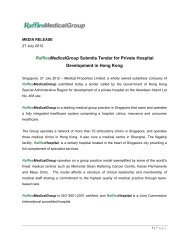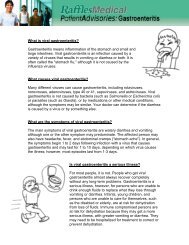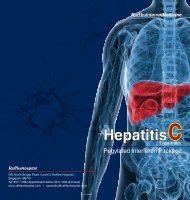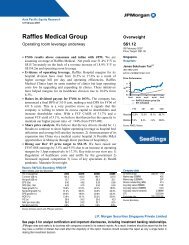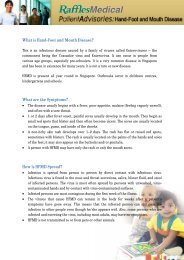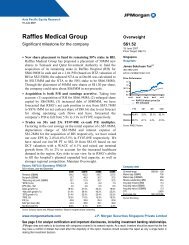Cancer You - Raffles Medical Group
Cancer You - Raffles Medical Group
Cancer You - Raffles Medical Group
Create successful ePaper yourself
Turn your PDF publications into a flip-book with our unique Google optimized e-Paper software.
<strong>Raffles</strong> HealthNews Q&A 29My mum has just been diagnosed with second stage coloncancer. I’m very worried for her as she is refusing to undergotreatment. What can I do to convince her to help her?There are many reasons why patients would refuse cancer treatment. These include denial of the disease, fear of theunknown and outcomes of the treatment, a fatalistic attitude that nothing would change, a lack of knowledge of medicaladvances that cancer is treatable, and personal reasons such as having a friend or relative who succumbed to cancer andnot wanting to be a burden to their dependents.I will usually involve the patient and the family in discussing the various treatment options. The discussion will revolvearound the benefits, risks, alternatives and survival rates for each treatment option (surgery, chemotherapy or radiationtherapy). Ultimately, the patient has to make his or her own decision, after having understood the benefits and risks oftreatment versus the complications and disease progression that may result in non-treatment.Family members play an important role in encouraging the patient to seek treatment.Usually, most patients are open to treatment options due to greater health awareness and earlier disease stage diagnosis.Dr Wong Kutt Sing, Specialist in General Surgery & Consultant, <strong>Raffles</strong> Surgery CentreHow does cancer get into the blood? What arethe cure rates like for cancers such as lymphoma,leukaemia and myeloma?Unfortunately, the causes of blood cancers are largely unknown. <strong>Cancer</strong> per se doesn’t get into the blood,but blood cancers are derived from blood cells in development in the bone marrow.Lymphomas and leukaemias can be classified into the aggressive or indolent variants. Aggressive lymphoma likediffuse large B-cell lymphoma, the commonest form of aggressive lymphoma, has a cure rate of about 65-70 percent.For aggressive leukemia, overall, even with the advent of stem cell transplantation, the cure rate is still ata dismal 30-40 percent.Indolent lymphomas or leukaemias and myeloma cannot be cured. They run a remitting or relapsing course. Only asmall minority of patients who go for a stem cell transplant from another donor may get cured. But this is rarely donenowadays. However, treatment of this group of disease is now improving by leaps and bounds with novel new drugs.Previously a newly diagnosed chronic myeloid leukaemia patient may have between three and five years to live.Today, the same patient would find that his disease is not too different from a chronic illness such as diabetes.Dr Daryl Tan, Specialist in Haematology & Consultant, <strong>Raffles</strong> <strong>Cancer</strong> Centre



